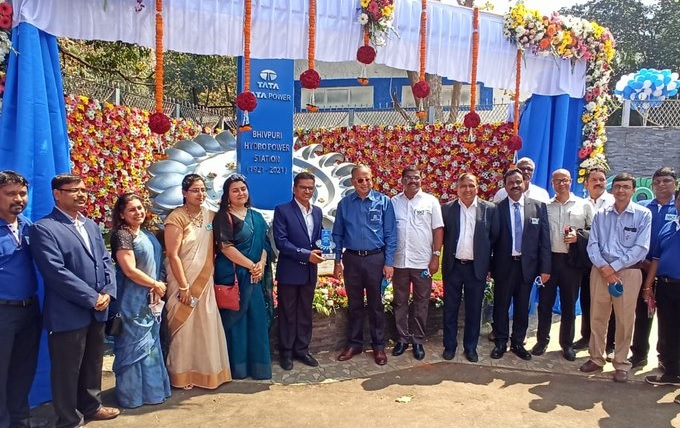Glorious 100 years of Tata Power's Bhivpuri Hydro Power Plant
The plant is one of the oldest in India, produces around 300 MUs of electricity annually and has provided clean energy for over 100 years to the nation.

New Delhi: Tata Power, one of India's largest integrated power companies, celebrated the glorious feat of completing the 100th anniversary of its hydroelectric power plant in Bhivpuri, Maharashtra. The plant, one of the oldest in India, produces around 300 MUs of electricity annually and has provided clean energy for over 100 years to the nation. This remarkable achievement also coincides with the Azadi ka Amrit Mahotsav, India@75 and demonstrates Tata Power's efforts to 'Power India and Empower Bharat' for over 100 years.
The Company started building the Bhivpuri Powerhouse in 1916. It is situated in the Raigad district of Maharashtra near Mumbai. The project was commissioned in 1922, with an installed capacity of 48 MW, which was subsequently upgraded to 75 MW including a 72 MW new powerhouse, with three units of 24 MW. It also includes 3 MW tailrace powerhouse comprising two units of 1.5 MW each. The plant now transmits power over 110 kV transmission lines to industries and licensees in the Mumbai metropolis.
Speaking about this milestone, Dr. Praveer Sinha, CEO&MD, Tata Power, said, "It's a proud moment for all of us at Tata Power to mark the centenary celebration of Bhivpuri Hydro Power Station. We are committed to providing clean energy through this plant and on this occasion reaffirm our commitment to achieve clean and green energy capacity of 80% by 2030; thus contributing towards India's clean energy targets."
The Bhivpuri plant along with the Khopoli and Bhira is among the first hydroelectric plants in the region that harnesses the major water resources of the Western Ghats in Maharashtra. Today, these three plants make up Mumbai's 'islanding system', the backup power source that kicks-in in case metropolis' power supply gets impacted—akin to an inverter system installed inside households.
The clean and cheap power generated at Bhivpuri Hydro Power Plant has helped curb pollution in Mumbai, one of the world's busiest and densely populated cities.
The water released from the Bhivpuri plant along with the Khopoli and Bhira hydel plants meets the Ulhas, Patalganga, and Kundalika rivers in the Konkan region. This water has enabled rapid industrialization, urbanization, irrigation development, commercial trades, etc. in the downstream areas of Karjat, Ambernath, Ulhasnagar, Thane, Badlapur, Mira-Bhayander, Vasai, etc.
For the past 100 years, Tata Power has been involved in a variety of economic and community development projects around the Bhivpuri Hydro plant. This includes the establishment of Dhaaga centers to support the livelihood of underprivileged community women, training rural women for producing herbal healthcare products, education excellence schemes for teachers and students to improve their academic performance, training teachers on biodiversity and environment, water and renewable energy schemes. It has also undertaken initiatives to create employment and run various healthcare programmes to provide primary healthcare to remote villages. These initiatives not only provides growth opportunities to the targeted communities but also empowers them.
Plants like Bhivpuri Hydro Power Station are important contributors to the company's journey to promote clean and green power and to achieve carbon neutrality before 2045.
Read Also : KABIL inks MoU with CSIR-NGRI for advancing geophysical investigations in critical and strategic minerals sectorNews Must Read
- SJVN Limited inaugurates India's first Multi-purpose Green Hydrogen Pilot Project
- KRDCL, RVNL JV emerges as the Lowest Bidder for Redevelopment of Thiruvananthapuram Central Railway Station
- REC Ltd. has incorporated subsidiary company BPTL
- Hon’ble Vice President of India Confers `Outstanding PSU of the Year’ Award on HAL
- BharatPe Launches India’s first All-in-One Payment Device
- NBCC registers historical Performance in FY2023-24
- RuPay Unveils Link it, Forget it Campaign at IPL 2024 to Promote RuPay Credit Card on UPI
- NTPC Green Energy Limited Inks MoU with Indus Towers Limited
- CIL’s capex up 6.5% to highest Rs.19,840 Crores in FY 2024
- SCOPE presents SCOPE PREMIER LEAGUE